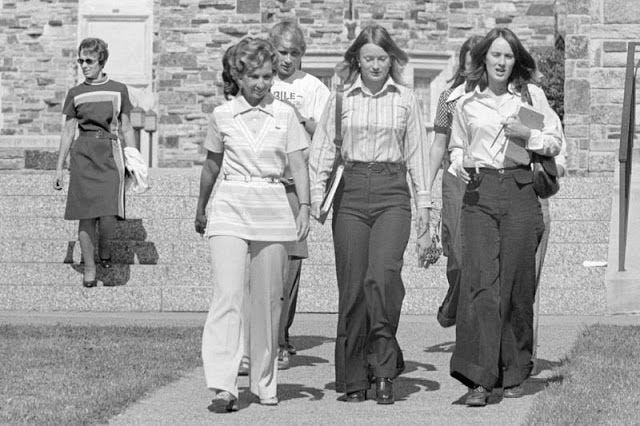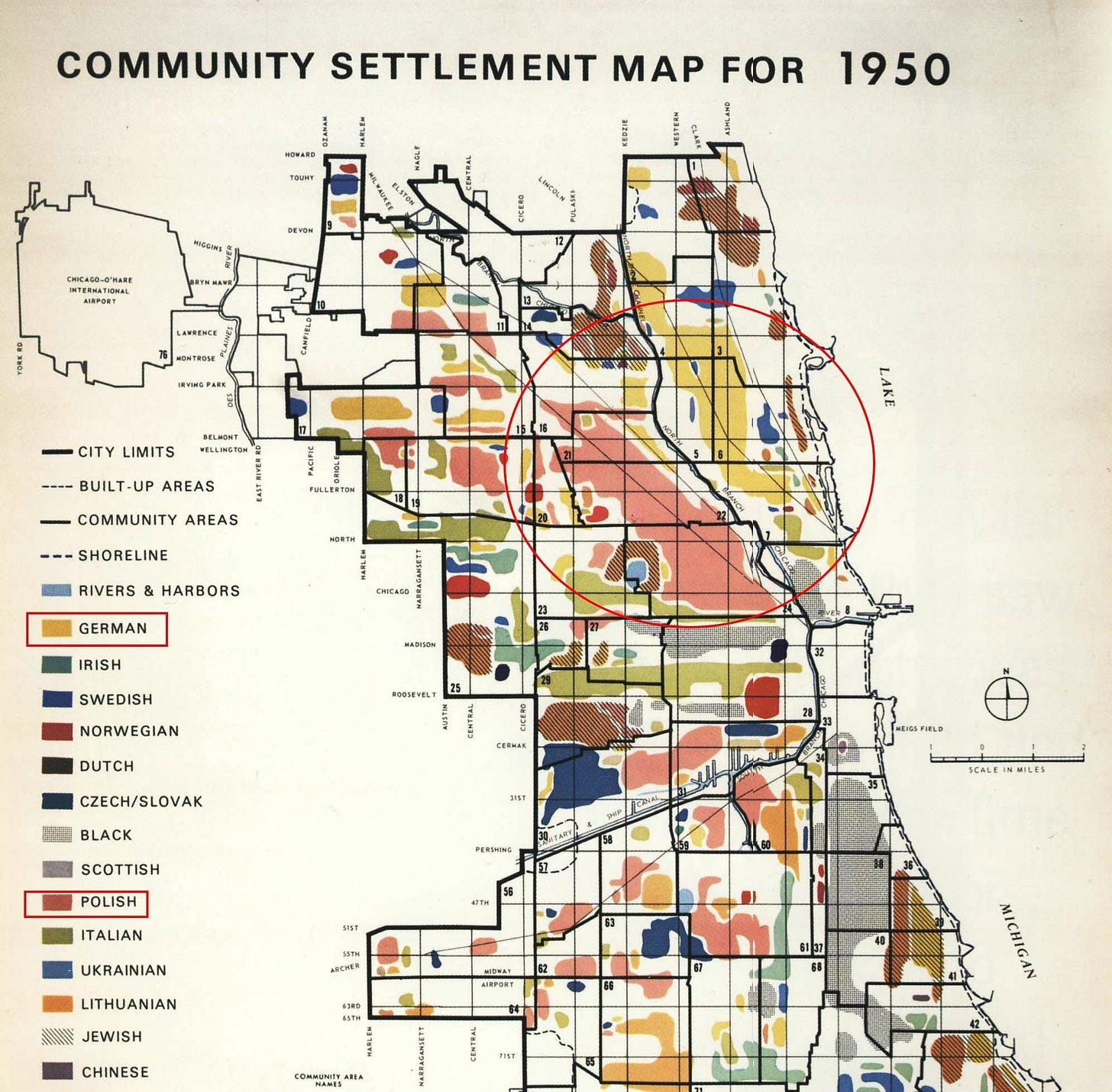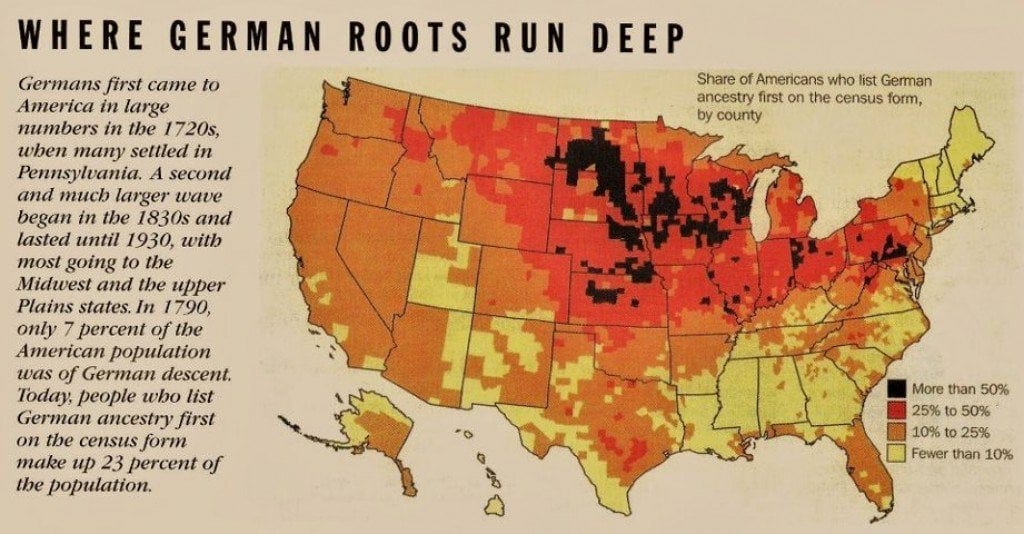Make someone’s day: Gift a subscription to your friends and family!
The United States is a nation that has undergone profound transformations over the last century. One of the most profound transformations, however, has been almost totally neglected in the history books and popular understanding.
This is the transformation of the United States:
From a highly decentralized society with huge ethnic, racial, religious, and regional differences.
Into a highly centralized society with one big class cleavage between the professional class and the rest of society, plus
A transformation of the claimed values of the American upper class.
America before 1930
Today, we like to claim that America is unusually diverse and more diverse than any time in our history.
I disagree.
The United States before 1930 was far more diverse than today based on culture, ethnicity, religion, and region. The problem is that most Americans today almost immediately think of race as the only form of diversity. When you expand the concept of “diversity” into culture, ethnicity, religion, and region, then America was far more diverse in previous centuries.
Today many people think of diversity as being part of one of the four racial groups: Whites, Blacks, Asians, and Hispanics.
Before World War II, however, most people outside of the Deep South thought in terms of ethnicities and religions, rather than race. Outside of the Deep South, people did not even think in terms of race very much.
There were no White Americans; there were Italian Americans, Jewish Americans, German Americans, Norwegian Americans, Polish Americans, and Irish Americans. Each of these ethnic groups (and many others) was heavily concentrated geographically in a small portion of the nation, and each group tended to have local self-governance.
Before 1930, the United States had:
A very decentralized government structure dominated by local and state governments.
This decentralization was enshrined in the US Constitution under the concept of federalism. The federal government played very little role in domestic affairs. The modern welfare state was almost completely absent.In general, even local and state governments did not intervene substantially in the economy. Very few social programs of any kind existed.
A vast number of ethnic and religious minorities were scattered across the nation.
These minorities were heavily concentrated geographically, so typically one ethno-religious group had the majority in any one locality or neighborhood.
Where no ethno-religious group possessed the majority, minority groups typically banded together to form local governing coalitions (typically via the Democratic party). This was most often the case in large industrial cities of the Northeast and Midwest.
Because of the decentralization mentioned above, these ethno-religious minorities had de facto governance over themselves.
A WASP upper class in the Northeast and Midwest ran:
the federal government (which had little impact on domestic affairs)
most large organizations, such as corporations and non-profits
state governments in the Northeast and Midwest.
small town governments in the Northeast and Midwest.
While coalitions of ethno-religious minorities ran big city governments and the Southern state governments under the framework of the Democratic party.
So we had diversity, decentralization, and voluntary segregation.
All of this worked fairly well, with the obvious exception of Jim Crow racial segregation in the South imposed by the white-dominated Democratic party. Jim Crow laws effectively removed almost all the benefits of American citizenship from blacks in the South. Elsewhere, ethnoreligious minorities could essentially self-govern with minimal federal government interference.
This US Census Bureau map gives you some idea of the geographical distribution of ethno-religious groups in the United States (though this map is missing a huge number of smaller groups, so it greatly underestimates the actual levels of diversity):
Northern New England had a British majority with a strong French-Canadian minority, particularly near the Canadian border. Southern New England had a British majority with a strong Irish Catholic minority in the cities. And each neighborhood in those cities was clearly either British or Irish. Few lived in the “wrong” neighborhood.
The New York City region was even more diverse. While one might look at the overall composition of the city and declare it “diverse,” any individual neighborhood was nothing of the sort. A neighborhood was either British, Italian, Irish, Black, Jewish, or one of the dozens of other ethnic groups that lived in the region.
At the national level, America was extremely diverse. At the regional and neighborhood level, America tended to be ethnically homogeneous.

The industrial cities of the Midwest were similar to New York City with a wide variety of ethnically homogenous ethnic groups, primarily from Eastern Europe. Chicago is a good example of an industrial city with a plethora of ethnic neighborhoods.
You can pretty much choose any large city in the Northeast and Midwest before 1930 to see similar ethnic neighborhoods. A few of the most notable cities were: New York City, Chicago, Philadelphia, Detroit, Cleveland, St. Louis, Boston, Baltimore, Pittsburgh, and Buffalo. Each city typically had a local WASP upper class running the large institutions and the state governments, while a hodge-podge of typically Catholic ethnic minorities ran the city government, unions, churches, and neighborhood organizations.
The rural Midwestern regions stretching westward from Pennsylvania through the Dakotas were heavily German.
The northern tier of the rural Midwest was also heavily Norwegian, Finnish, Swedish, or Danish.
Just as important, many of these ethnic groups were divided internally by religion. This was particularly true of the two largest ethnic minorities: the British and Germans.
Americans of British descent often identified themselves first and foremost as Methodist, Baptist, Mormon, or Episcopalian. Germans were divided into Protestants, Catholics, and Jews. Each religious group kept to themselves socially and rarely socialized outside their religious group.
See also my other articles and podcasts on Ideology:
Why Ideologies Threaten Progress (Part 1 of 3-part podcast series)
Why ideologies fail (podcast)
Descent into a man-made Hell: Understanding modern Totalitarianism
You might also be interested in reading my “From Poverty to Progress” book series:
What this effectively meant was that ethno-religious groups were highly segregated until World War II. What we have seen over the last century has been the:
Gradual disappearance of cultural, ethnic, religious, and regional diversity, particularly among white Americans.
Dramatic centralization of American institutions, particularly a growth of the federal government.
A flood of new members of the upper class so that the old WASP elite is now only a tiny portion of the upper class.
A radical change in the stated values of the upper class.
Stages in the Great Realignment
We can identify three main stages in this transformation:
From the American Revolution until about 1940, the United States was a patchwork of diverse local ethno-religious majority coalitions that loosely cooperated together at the national level. They were typically national minorities, but they typically formed majorities (or something close to it) on the local level.
The nation was run at the national level by an informal alliance of WASP upper class in the cities in the Northeast and Midwest.
But the vast majority of the power was at the state and local level, so the vast majority of ethno-religious minorities felt they had a stake in the system and control over their own lives. Blacks in the Deep South were an obvious exception.From 1940 until about 1970, the American Nation experienced:
Massive economic growth.
Massive increase in American influence in world affairs.
Centralization of power in the federal government, largely as a result of World War II and the New Deal.
Massive expansion of the upper class to include virtually members from all ethno-religious groups and regions. The new entrants into the upper class largely accepted the worldview of the old WASP upper class that had run the nation for centuries.
The four-year college degree became the de facto marker of who was in the upper class and who was not. Institutions hired those with such degrees because knew that it was a marker of:
Above-average intelligence
Above-average work ethic
Basic knowledge of the skills of the profession
Socialization into the values of the old WASP upper class.
From 1970 to today, we have seen:
Continued massive economic growth and American influence in world affairs.
An even stronger centralization of power within the federal government.
A strong divergence of political views, cultural views, and consumption habits of the professional class from the rest of America. The traditional views of the old WASP upper class were replaced by a Post-Modern Left-of-Center worldview:
Patriotism has been replaced by cosmopolitanism, and often downright anti-patriotism.
A self-confident belief in progress has been replaced by a post-modern skepticism of or even opposition to progress.
Partisan identification has shifted from Republican to Democratic, particularly in the large metro areas in the Northeast and Pacific coast.
Ideology has shifted from conservatism to varying degrees of Left-of-Center ideology. The percentage of the professional class who are very Left-of-Center has increased dramatically, particularly since 2010.
A dramatic feminization of the upper class. While those in the old WASP upper class who staffed our institutions were overwhelmingly male, now the upper class is something like 50-50 with some institutions becoming female-dominated. This is unprecedented among all previous upper classes in other societies.
The combination of strong centralization of power within the federal government and an upper class with very different views from the rest of society has enabled this upper class to attempt to transform the rest of society in their own image.
So what are the results of this great transformation?
The new American upper class
Because of their Post-Modern Left-of-Center worldview, the new upper class pushed through institutional reforms over the last 60 years. Below are just some of the results:
The implementation of public policies that undermine the foundations of material progress.
A dramatic expansion of the means-test programs in the American welfare state that undermined Upward Mobility for the poor and working class.
Massive bureaucratization of our institutions that just happened to provide the new upper class with cushy jobs that are relatively isolated from the need to produce results.
DEI policies that undermine Merit in hiring, firing, and promotions within institutions.
Declining education standards and grade inflation so the four-year degree is no longer a sign of higher intelligence, hard work, skills, or positive socialization.
The new upper class preaches values that are very different from their revealed preferences on work, marriage, etc. This undermines the ability of the lower classes to copy the successful.
The new upper class valorizes, or at least tolerates, self-destructive behavior that undermines traditional attitudes that promoted Upward Mobility for the working class and poor.
The new upper class valorizes, or at least tolerates, anti-social behavior, such as confrontational and even violent behavior. Most of all, it valorizes abusing power to forward one’s own ideological views at the expense of the rest of the nation.
The new upper class undermines the moral legitimacy of parents, peer pressure, and law enforcement to deal with self-destructive and anti-social behaviors.
The new upper class brands any opposition to the above as “populism,” “racism,” “misogyny,” “fascism,” or “far right.” Ironically, they tell all dissenters to “check your privilege.”
In short, the American nation is now run by an incompetent and destructive upper class that undermines its own rule. They are destructive, not because they have a will to destroy, but because their world view sees the foundations of material progress as inequalities that need to be uprooted. They are incompetent not due to a lack of intelligence, credentials, knowledge, or skills. They are incompetent because their ideological assumptions conflict with success in material reality.
Because those ideological assumptions conflict with reality, it becomes increasingly important for the members of the upper class to focus on managing perceptions rather than solving problems. This guarantees incompetent behavior and bad behavior regardless of intelligence, credentials, knowledge, or skills. It also guarantees that the upper class much further insulate itself from the competition, merit, transparency, and decentralization needed.
The American upper class has abandoned a worldview that worked, they have replaced it with an enticing new worldview that does not work. And because that worldview is based on moral assumptions, they cannot face the fact that our problems are caused by how they perceive the world. So instead, they focus on managing perceptions with spin, evasion, and stringing together buzzwords into semi-coherent sentences. This ultimately makes it far more difficult for the nation to solve its problem.
As I have argued in other articles, this trend moves us toward what I call “Soft Totalitarianism.”
So what is to be done?
The main goal for the next generation should be to:
Roll back these “reforms” implemented by an incompetent and destructive upper class, while:
Maintaining and rebuilding the foundations of material progress and upward mobility.
Neither blind support of elites nor populist opposition to those elites will get us very far, but the blind support of our current elites is far more dangerous. Supporters of progress must channel the legitimate frustrations of those who are angry at our upper class toward reforms that work.
I do not claim that this will be easy. American institutions have been greatly deformed by the Post-Modern Left-of-Center worldview, and the people who support that world view will not go down without a fight.
Fortunately, I do not think we need to tear down everything and start over. American institutions have functioned extremely well for 200 years. We just need to rediscover what made them work in the first place. We also need to push those principles to their logical consequences.
Meet the new boss; same as the old boss
Self-serving elites who try to extract wealth from the masses and glorify their own status and greater morality have been a problem with the human condition since the invention of agriculture. The new upper class with its Post-Modern Left-of-Center worldview is just the latest incarnation of elites who pretend to be the opposite of what they are.
Fortunately, humanity has already evolved defenses against such elites. Indeed, those defenses are a key part of the foundations of material progress.
What is to be done?
I will go into much more detail in other articles, but I believe the following principles will limit the negative impacts of Post-Modern Left-of-Center worldview of the American upper class:
Freedom of speech, particularly on social media. Social media will only get more important as a means of communication, and there have been clear attempts by the federal government to restrict freedom of speech on those platforms.
If we lose freedom of speech, all our other rights are in much greater danger.Transparency - The Post-Modern upper class thrives in secrecy. The more the American people know about what is going on within bureaucracies, the easier it is for us to fight back.
Merit-based hiring, firing, and promotions - The key to smuggling activists into public and private bureaucracies are the policies of Diversity, Equity, and Inclusion. This undermines the proper functioning of all our institutions and undermines their legitimacy. Worse, it is blatant racial and gender discrimination.
Radical reductions in government, corporate, and non-profit bureaucracies - Post-Modern upper class thrive in bureaucracies. The smaller the bureaucracy, the less likely that Post-Modern upper class impose their will slowly by bureaucratic rules.
Decentralization - The Founders established the US Constitution on the principle of Federalism, but we have gotten away from it in the last century. We need a massive shift of domestic powers away from the federal government and towards the state and local governments.
Competition between institutions - Competition forces organizes to focus on results. And if free citizens get to choose which institutions to vote for, work within, buy from, invest in, and donate to, then a large portion of those results flow to the masses.
Elimination of government subsidies - Government subsidies isolate organizations from competition, so they tend to produce bad results.
Creation of new institutions based on the above principles to compete with ideologically captured institutions.
I will write future articles that go into more detail on these principles.
E Pluribus Unum!
See also my other articles and podcasts on Ideology:
Why Ideologies Threaten Progress (Part 1 of 3-part podcast series)
Why ideologies fail (podcast)
Descent into a man-made Hell: Understanding modern Totalitarianism
You might also be interested in reading my “From Poverty to Progress” book series:












I am favorably impressed by this piece. I have relevant observations of life in the South in the 50s and 60s and how the “War on Poverty” guaranteed the outcome we see today. Think I will read some more of your stuff.
I am finding your more recent set of posts exploring some of these social science aspects very interesting, especially as you still have a direct or indirect link back to your core progress supporting factors.
My own experience sort of confirms your comments on social homogenization after 1940. As a child in the 50s/60s, I moved from the midwest to the NE, then to the NW, and to the South for HS, before returning to the midwest for college. My perception in these widely distant locations was that everything was pretty much the same, in general. As a child with a nonreligious upbringing, I also perceived the various religious groups as just one overall set of believers and was pretty ignorant of the interpretive differences that might have exercised members of one group vs. another. I had Catholic, Protestant, and Jewish friends in HS.
I knew Germans were a major element of American citizenry from Revolutionary times, but was surprised by just how large and impactful that "national" or ethnic group was across so much of the country, rather than just more localized influence in PA, IL, MO, and TX. Plus my parents (and thus I) were of German heritage, with 3 of 4 grandparents US citizens by 1890 or so. And the religious mixing was personal, as my mother was raised Catholic and my father Methodist. But I never asked them how they managed to get together across that divide :-).